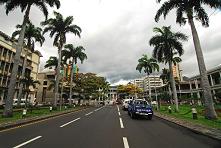
Typical street scene in Santa Ana, El Salvador. (Photo: iStock)
IMF Survey: IMF Set to Open New Training Center for Sub-Saharan Africa
December 27, 2012
- Mauritius will host new training hub tailored to Africa’s needs
- Aim is to build knowledge in macroeconomic management
- Donor financing makes possible this expansion of IMF training
To better serve its member countries in sub-Saharan Africa, the IMF will open a regional training center in the southern African country of Mauritius.

Port Louis, Mauritius, where new IMF training center will deliver macroeconomic management courses (photo: Anthony Asael/Newscom)
CAPACITY BUILDING IN AFRICA
The Africa Training Institute, set to open in 2013, joins a network of centers around the world in helping develop countries’ policymaking capacity by transferring economic skills and best practices. While nearly a quarter of the 7,800 officials trained by the IMF in the last fiscal year were from sub-Saharan Africa, this new center on the continent will allow the IMF to train more government officials there in the future.
Speaking at a ceremony in Port Louis on December 27, Managing Director Christine Lagarde noted that IMF training helps countries build knowledge on the topics essential for effective macroeconomic and financial management of their economies in support of growth and poverty reduction.
“It is helping countries develop and reduce poverty in a very real sense,” Lagarde stressed.
Demand outpaces supply
In the past 15 years, Africa has made great strides in macroeconomic stability and economic development, resulting in better standards of living for many on the continent. This progress is partly attributable to improved macroeconomic policies. Through its technical assistance and training, the IMF has contributed to helping country officials gain the skills to design and implement sound policies.
But demand for training far outpaces supply. Feedback from African governments indicates that they would like to receive more training from the IMF, a clear signal that IMF training is effective in responding to their needs. Courses currently offered by the IMF with the African Development Bank, through the Joint Partnership for Africa, and with other training partners in Africa meet only a part of the demand for macroeconomic training.
Conscious of the need to build capacity in sub-Saharan Africa, the government of Mauritius is stepping up its contribution to the IMF’s endeavor by responding to the IMF’s open bid to host a regional training center. The government is providing a substantial cash contribution in addition to donating the physical training facilities.
This contribution—together with contributions from the Australian Agency for International Development and the Chinese authorities—allows the IMF to establish a regional training center in Mauritius, which will increase the number and the spectrum of courses offered to sub-Saharan African officials.
Through the Africa Training Institute, the Fund will deliver a broad curriculum of macroeconomic management courses from fiscal, monetary, and exchange rate policies to debt sustainability and the management of natural resource revenue—an area that is increasingly important for countries in Africa. The curriculum will also cover issues in regional integration.
The center’s courses will be tailored to the needs of African policymakers and anchored in the realities of macroeconomic management in Africa, a key advantage of a regionally based institute.
Achieving synergies
In October 2011, the IMF created its fourth African regional technical assistance center (AFRITAC) in Mauritius. The opening of a new training institute in close proximity to AFRITAC South—with a director who is also the head of AFRITAC South—will allow greater synergies between training and technical assistance. The Institute also will provide the opportunity to bring together more officials from different countries to share their experiences and to gain new skills through interactions with experts.
At the ceremony, where the IMF and the Mauritian authorities exchanged financing documents to establish the training center, Lagarde highlighted Mauritius’ far-sighted leadership role in increasing Africa’s capacity to develop and implement successful macroeconomic policies.
“I am confident that hosting these two very important centers will support Mauritius’ overarching strategy to become a knowledge hub for sub-Saharan Africa, while helping to address urgent needs in Africa,” she said.
Deeper impact
The institute in Mauritius will be financed by a multidonor trust fund, with contributors providing oversight through a steering committee. Australia and China have already pledged financial support for the institute.
As with the IMF’s other regional training centers in Austria, Kuwait, and Singapore, the Africa Training Institute will allow the IMF to establish a comprehensive training strategy for countries in the region.
To meet the ever-increasing demand for IMF training from sub-Saharan Africa, while bringing the region’s training on par with the others, the African Training Institute will need to deliver even more courses than the current contributions allow. The IMF and the authorities of Mauritius will continue their efforts to mobilize funds from other donors as well.







